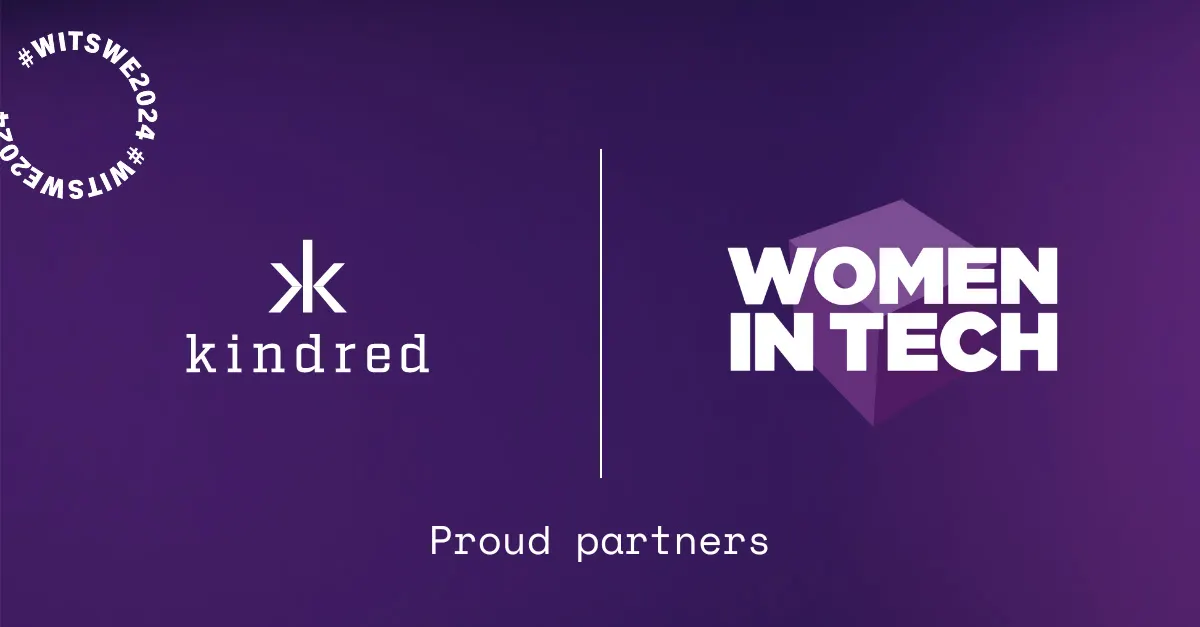
Kindred is a long-time supporter of Women in Tech Sweden and has, for the eighth consecutive year in a row, signed up as a Co-Creating Partner and will participate at the conference that will take place at Waterfront on 17 April in Stockholm. Women in Tech Sweden is a non-profit organization supported by some of Sweden's largest and most influential businesses, which share the organization's mission to inspire more women to choose and stay in tech. Supporting Women in Tech's mission is very important for Kindred. It is not just the networking, knowledge-sharing, and face-to-face meetings but also gives us a chance to put an extra spotlight on our Tech-Superstars.

We chatted with Charlotta Shelbourg, Head of PS Product Management at Kindred, to hear more about making tech more inclusive and what makes for a good tech career (hint: it's not a math whiz).
So, Charlotta, let's start with the basics: how did you end up in the tech world?
"I was working on a Travel and expense system in a finance company, being the main stakeholder in the product. That's when I got a taste of how product development works, and I found it surprisingly fun and creative, which wasn't what I thought about the tech industry previously."
And that got you into tech?
"Yeah, it pushed me in that direction. But there were other things too, like the chance to work in a more creative and dynamic place, do impactful work, and explore a different career path. It turned out that it was a perfect fit for me, but it took some time to get over my initial doubts."
Can you tell us more about those doubts you had?
"I think in Sweden, we tend to label people as 'math brains' or 'language brains,' like you're naturally good at one or the other. That concept can be really limiting. I was told I had a 'language brain,' and tech was seen as only for 'math brains.' My education was economics, not STEM, so I thought someone with my profile wouldn't be considered for a job in tech and I doubted I'd be good at it. Besides this, there weren't many female role models. So, it was hard for me to even consider such a career move. "
That doesn't sound easy. Was it discouraging?
Yeah, it was and still is for young people, especially girls today. It wasn't until later, after I'd gained some work experience and more confidence, that I questioned that idea. But I'm glad I did. Now, I have a much better understanding of what matters."
And what does matter to you?
"It comes down to being curious- asking questions, challenging status quo, being creative, and being able to bounce back from challenges – basically, being good at solving problems."
You mentioned the lack of female role models. Why do you think that's still a problem?
"The tech industry has this image of being disruptive and a bit rebellious. That makes the stereotype of the 'guy coding in his basement' popular. Education systems couldn't keep up, and comparing someone who's gone through a five-year education to someone who's spent three years in a basement coding for fun and due to interest, the latter would be more senior, which plays into the industry's unconventional image; this makes it harder for women, who were told to 'be a good girl and study hard.'
Together with most senior leaders in the tech industry being men, it is hard even to get recruited due to gender bias and stereotypes. It's easier for women to see themselves in tech with role models and break away from cultural expectations; this is sad because the tech industry, compared to other industries, is one of the easiest to achieve a good work-life balance. The previous toxic work environments that may have been unwelcoming to women are gone, and the increasing diversity of cultures creates very open and friendly work environments. But with the need for more female role models, the presumptions of male-dominated cultures and long hours are difficult to eliminate... I hope more role models will arise as the tech world matures."
Now, you lead a team of 120+ people at Kindred. Can you tell us about that?
"It's awesome! It's a diverse team, and having different perspectives makes us more open and inclusive. Leading in this kind of environment is satisfying. The key to making good decisions is paying attention to what's happening and being part of the conversation in your team.
Are there any other things that contribute to your success?
"Adding to what I've said earlier, I think we should focus on the results we want, not the exact process of getting there. I expect good results from the people I work with, but that shouldn't stop personal initiative or creativity. Also, tech moves fast, and there are always new things shaking up the way we do things. We need to stay flexible and keep our curiosity alive."
Last question: what makes Kindred stand out, in your opinion?
"At Kindred, we're eager to stay ahead, not just in making our customers happy but also in creating a more sustainable industry. We're truly into having our product leading the way forward.
This is reflected in our way of working, where solving problems – there it is again! – is at the center of what we do."
Thanks, Charlotta – until next time!


